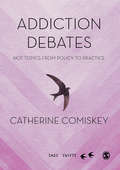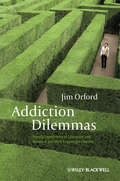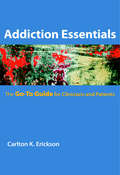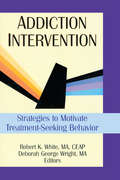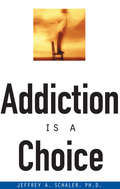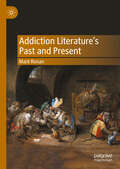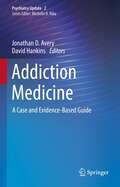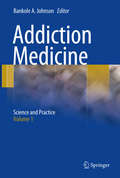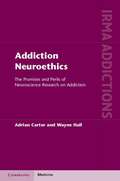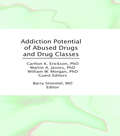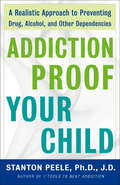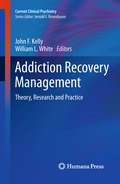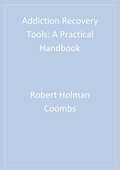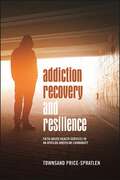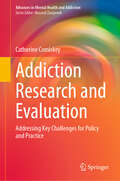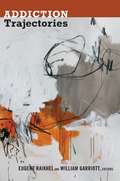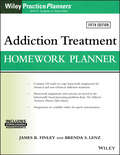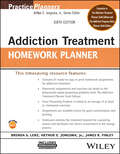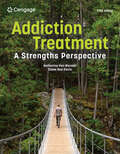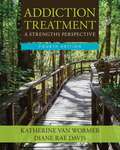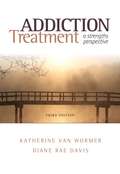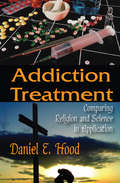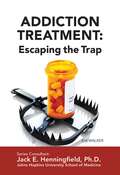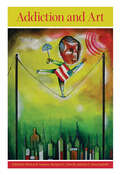- Table View
- List View
Addiction Debates: Hot Topics from Policy to Practice (SAGE Swifts)
by Catherine ComiskeyAddiction Debates explores the tumultuous landscape of addiction research, policy and practice. Covering all the 'hot topics' of the day in a balanced and informative manner, Comiskey provides international perspectives on each topic, stimulating debate and discussion via the different approaches taken globally. Considering the complexities of debates around legalisation, rehabilitation, abstinence, harm reduction, and the current opioid epidemic, this SAGE Swift also looks into the health and social concerns related to drug consumption. Less-often debated topics include the ageing population of people who use drugs, the rights of the child of parents who use drugs, and the pressure these unique factors put on public health and associated services. A relevant text for a range of disciplines and people, sure to inform, challenge and continue the debate.
Addiction Debates: Hot Topics from Policy to Practice (SAGE Swifts)
by Catherine ComiskeyAddiction Debates explores the tumultuous landscape of addiction research, policy and practice. Covering all the ′hot topics′ of the day in a balanced and informative manner, Comiskey provides international perspectives on each topic, stimulating debate and discussion via the different approaches taken globally. Considering the complexities of debates around legalisation, rehabilitation, abstinence, harm reduction, and the current opioid epidemic, this SAGE Swift also looks into the health and social concerns related to drug consumption. Less-often debated topics include the ageing population of people who use drugs, the rights of the child of parents who use drugs, and the pressure these unique factors put on public health and associated services. A relevant text for a range of disciplines and people, sure to inform, challenge and continue the debate.
Addiction Dilemmas
by Jim OrfordAddiction Dilemmas explores the impact of addiction on those closest to the individuals affected and their families. Drawing on a wide range of sources, the book discusses the stresses and strains that family members are subjected to, the dilemmas that they face, and the coping strategies that they have found useful.Draws on a unique breadth of material to illustrate the dilemmas faced by family members in coping with a close relative's addictionRaises questions and points to controversies rather than dispensing prescriptive "one size fits all" adviceBrings together accounts from research interviews, biography, autobiography and relevant fiction in a creative and original wayTackles common misunderstandings at public, practitioner, scholarly and policy levels about the predicaments that family members commonly find themselves inEach chapter closes with a commentary, questions and exercises designed to further develop understanding for professionals and students
Addiction Essentials: The Go-To Guide for Clinicians and Patients (Go-To Guides for Mental Health)
by Carlton K. EricksonAn up-to-date guide to the causes, diagnosis, and treatment of addictions. Whether it's to caffeine, nicotine, or alcohol, many of us suffer from at least one addiction. Carlton K. Erickson presents a comprehensive overview of the various types of addictions--covering both substance and nonsubstance addictions such as gambling, Internet use, and video games--and their diagnosis and treatment. This book sheds light upon the biological and environmental factors that cause addiction, reviews the various types of substance and nonsubstance addictions, and offers clinicians and patients hope for recovery. Erickson examines alcohol, drugs that speed us up, drugs that slow us down, and how to recognize addictive behavior--such as exercise and videogame addiction--which may be less obvious. Other topics covered include alcohol and other drug pharmacology, neurophysiology of brain pathways, alcohol and drug interactions, adolescent drug use, drug use differences by gender and culture, and visual signs of drug use. Erickson presents various therapeutic methods for addressing addiction, including pharmacological interventions, individual or group therapy, twelve-step programs, and therapy involving family members. Finally, he reflects on the involvement of family and the risks and consequences of relapse. Written by one of the country's leading addiction specialists, this accessible, comprehensive book, is a go-to reference for your questions about addiction, and a friendly introduction to the diagnosis and treatment options.
Addiction Intervention: Strategies to Motivate Treatment-Seeking Behavior
by Bruce Carruth Deborah G Wright Robert K WhiteAddiction Intervention: Strategies to Motivate Treatment-Seeking Behavior shows you how to use the tools of intervention--the words, the steps, and the strategies--to be a change agent in the lives of individuals with alcohol and drug addictions. It is full of effective strategies and case studies coming from widely respected specialists across several disciplines. You'll learn how you can get people to seek help for their chemical dependence, resolving the cause of their problems rather than temporarily fixing the symptoms or side effects of their addictions.Whether you're an alcohol and drug educator, intervention trainer, physician, nurse, social worker, employer, lawyer, judge, or counselor, Addiction Intervention will help you find ways to confront chemically dependent people and motivate them to change their lives. You will find the tools of intervention easier to wield than you might otherwise think as you read about:how physicians can assess symptoms using various diagnostic tools, initiate conversation with a patient, and overcome resistance to referralhow clinical therapists can develop response-specific intervention strategies that are appropriate to clients’behavior pathologyconducting effective performance-related workplace interventionsthe development and design of impaired professional committeesalternative models for peer and administrative interventionsthe methodologies of student assistance programs and teamsbrief, structured therapy for the family of an addicted personrecent changes in the criminal justice system that have encouraged judges to refer individuals to treatmentthe One-Stop Re-Employment Social Services CenterAddiction Intervention brings within your reach results-oriented intervention. Don't continue to offer band-aid solutions or skirt around the real problem of addiction. This book will help you help people get their lives back on track permanently.
Addiction Is a Choice
by Ph.D. Jeffrey A. SchalerPoliticians and the media tell us that people who take drugs, including alcohol or nicotine, cannot help themselves. They are supposedly victims of the disease of 'addiciton', and they need 'treatment'. The same goes for sex addicts, shopping addicts, food addicts, gambling addicts, or even addicts to abusive relationships.This theory, which grew out of the Temperance movement and was developed and disseminated by the religious cult known as Alcoholics Anonymous, has not been confirmed by any factual research. Numerous scientific studies show that 'addicts' are in control of their behavior.Contrary to the shrill, mindless propaganda of the 'war on drugs', very few of the people who use alcohol, marijuana, heroin, or cocaine will ever become 'addicted', and of those who do become heavy drug users, most will matrue out of it in time, without treatment. Research indicates that 'treatment' is completely ineffective, an absolute waste of time and money.Instead of looking at drub addiction as a disease, Dr. Schaler proposes that we view it as willful commitment or dedication, akin to joining a religion or pursuing a romantic involvement. While heavy consumption of drugs is often foolish and self-destructive, it is a matter of personal choice.
Addiction Literature's Past and Present
by Mark RonanAddiction Literature's Past and Present aims to realign consideration of addiction as a transhistorical and transcultural aspect of the human condition. This book illuminates the premodern roots of the linguistic and narrative materials of addiction discourse and argues for Addiction Literature to be considered as a distinct literary phenomenon, with a history stretching back to Antiquity. Addiction, as it is understood in this book, exists at the intersection between appetite, habit and impaired personal behavioural agency. This book begins by exploring the ways in which we articulate the experience (both lived and observed) of addiction today, uncovering a core set of conceptual components and discursive tropes which are commonly associated with modern understandings of the phenomenon. Having established a common set of tropes and features which distinguish modern Addiction Literature as a distinct literary mode, it then considers premodern texts through this lens, revealing similar patterns of conception and convention in a broad range of historical periods and literary genres from Aesop to Shakespeare.
Addiction Medicine: A Case and Evidence-Based Guide (Psychiatry Update #2)
by Jonathan D. Avery David HankinsThis book provides an accessible, up-to-date understanding of how to treat patients with substance and non-substance-related addiction. It covers all the typical substance and non-substance use disorders and presents evidence in a case-based format.Concise and comprehensive, opening chapters relay a preliminary assessment of addiction disorders and their neurobiology. Subsequent chapters then offer specific treatment options, challenges, and cases relating to the abuse of distinct substances. The substances mentioned earlier include alcohol, opioids, stimulants, hallucinogens, and sedatives. Additionally, one chapter covers the unique issues associated with treating behavioral addictions, such as sex and gambling. Each chapter will outline cases in a fashion that will optimize the reader's experience. In closing, the book examines co-occurring substance use disorders and mental illness.An invaluable addition to the Psychiatry Update Series, Addiction Medicine is an essential reference for mental health clinicians, as well as primary care and family medicine clinicians.
Addiction Medicine: Science and Practice
by Bankole A. JohnsonThe spectrum of addiction disorders presents practitioners with numerous challenges--among them the widening gap between a growing evidence base and the translation of this knowledge into treatment outcomes. Addiction Medicine addresses this disconnect, clearly explaining the role of brain function in drug taking and other habit-forming behaviors, and applying this biobehavioral framework to the delivery of evidence-based treatment. Its state-of-the-art coverage provides clinically relevant details on not only traditional sources of addiction such as cocaine, opiates, and alcohol, but also more recently recognized substances of abuse (e.g., steroids, inhalants) as well as behavioral addictions (e.g., binge eating, compulsive gambling, hoarding). Current behavioral and medical therapies are discussed in depth, and the book's close attention to social context gives readers an added lens for personalizing treatment. An international panel of expert contributors offers the most up-to-date information on: Diagnosis and classification Neurobiological and molecular theories of addiction Behavioral concepts of addiction Clinical aspects of addiction to a wide range of substances, including opiates, stimulants, sedatives, hallucinogens, alcohol, nicotine, and caffeine Science-based treatment options: pharmacotherapy, pharmacogenetics, potential vaccines, brief and compliance-enhancing interventions, cognitive behavioral treatment, behavioral management, and other psychosocial interventions Behavioral addictions--including compulsive eating, Internet messaging, and hypersexuality--and their treatment Addiction in specific populations, including adolescents, the elderly, pregnant women, and health care professionals Legal, disability, and rehabilitation issues At once comprehensive and integrative, Addiction Medicine is an essential text and a practice-expanding tool for psychiatrists, health psychologists, pharmacologists, social workers, drug counselors, trainees, and general physicians/family practitioners.
Addiction Neuroethics
by Wayne Hall Adrian CarterAddiction is a significant health and social problem and one of the largest preventable causes of disease globally. Neuroscience promises to revolutionise our ability to treat addiction, lead to recognition of addiction as a 'real' disorder in need of medical treatment and thereby reduce stigma and discrimination. However, neuroscience raises numerous social and ethical challenges: * If addicted individuals are suffering from a brain disease that drives them to drug use, should we mandate treatment? * Does addiction impair an individual's ability to consent to research or treatment? * How will neuroscience affect social policies towards drug use? Addiction Neuroethics addresses these challenges by examining ethical implications of emerging neurobiological treatments, including: novel psychopharmacology, neurosurgery, drug vaccines to prevent relapse, and genetic screening to identify individuals who are vulnerable to addiction. Essential reading for academics, clinicians, researchers and policy-makers in the fields of addiction, mental health and public policy.
Addiction Potential of Abused Drugs and Drug Classes
by Barry StimmelIncrease your awareness of the relative addiction liabilities of various drugs and drug classes that are commonly abused. A timely and masterful new book, Addiction Potential of Abused Drugs and Drug Classes clarifies, in contemporary terminology, the state of addiction liability of cocaine, opiates, alcohol, sedative-hypnotics, nicotine, anxiolytics, marijuana, inhalants and anesthetics, and PCP and hallucinogens--the nine drugs that are most abused today. Authorities combine their research expertise with the available scientific literature to evaluate those factors which contribute to the addictive qualities of drugs. Specific chapters highlight the positive and negative reinforcement qualities that make drugs rewarding, focus on the two major subtypes of alcoholics, and cover the neuroanatomical and neurochemical bases of psychological dependence, the greatest contributing factor to drug addiction. An essential new resource for scientists, clinicians, and administrators, Addiction Potential of Abused Drugs and Drug Classes also highlights those areas where more work is needed in order to understand how individual drugs affect the processes of dependence, tolerance, and addiction, so that adequate treatment of these disorders can be discovered.The book was written for teachers and researchers in the chemical dependency field, to provide an up-to-date review of the literature. In addition, physicians, nurses, and pharmacists will find the book to be valuable as an update on the relative addiction strengths of abused drugs. Finally, treatment counselors and professionals with some knowledge of physiology and pharmacology will be interested in the book because of its relevance to the clinical treatment of chemically-dependent patients.
Addiction Proof Your Child: A Realistic Approach to Preventing Drug, Alcohol, and Other Dependencies
by Stanton PeeleIn a world where binge drinking, recreational and prescription drug abuse, chronic overeating and anorexia, and Internet gambling and pornography are all too common among teens, it's time to rethink the conventional wisdom about addiction. We clearly need something more than "just say no. " This book is the alternative.
Addiction Recovery Management: Theory, Research and Practice (Current Clinical Psychiatry)
by John F. Kelly William L. WhiteAddiction Recovery Management: Theory, Research, and Practice is the first book on the recovery management approach to addiction treatment and post-treatment support services. Distinctive in combining theory, research, and practice within the same text, this ground-breaking title includes authors who are the major theoreticians, researchers, systems administrators, clinicians and recovery advocates who have developed the model. State-of-the art and the definitive text on the topic, Addiction Recovery Management: Theory, Research, and Practice is mandatory reading for clinicians and all professionals who work with patients in recovery or who are interested in the field.
Addiction Recovery Tools: A Practical Handbook
by Dr Robert Holman CoombsAddiction Recovery Tools: A Practical Handbook presents verified recovery tools with a methodical "when and how" approach for each available tool. Including both Western and Eastern methods, the book catalogs the motivational, medical-pharmaceutical, cognitive-behavioral, psychosocial, and holistic tools accessible in a wide variety of settings and programs.
Addiction Recovery and Resilience: Faith-based Health Services in an African American Community (SUNY series in African American Studies)
by Townsand Price-SpratlenWe live in an era of substance misuse colliding with public health shortcomings. Consequences of mass incarceration and other racial disparities of the "drug war" are felt acutely in the neighborhoods and communities least equipped to deal with them. More than 600,000 people are released from US prisons each year; nearly two-thirds of returning citizens have a substance use disorder (SUD) and have limited access to treatment. Even among the general public, only one in ten people with SUD receive any type of specialty treatment. Community organizations make important contributions to improve access and help to heal these societal fractures. Using a social ecology of resilience model, Addiction Recovery and Resilience is a yearslong ethnographic case study of a faith-based health organization with a focus on long-term recovery. It explores the organization's triumphs and missteps as it has worked to respond to the opioid crisis and improve the health of affiliates and the neighborhood for nearly twenty years. Addiction Recovery and Resilience concludes with best practices for individual, organizational, and community health and public policy at a time when nontraditional health care providers are increasingly important.
Addiction Research and Evaluation: Addressing Key Challenges for Policy and Practice (Advances in Mental Health and Addiction)
by Catherine ComiskeyAccording to the United Nations Office of Drugs and Crime, around 284 million people aged between 15 and 64 years used drugs in the year 2020. In addition, it is estimated that over 11 million people were injecting drugs and half of these were living with hepatitis C. Young people are using more drugs than previously, and numbers have increased over the past decade. While numbers are estimated at a global level, there remains little evidence for practitioners and policy makers on key questions, such as how many people are using drugs that are hidden and haven’t contacted services. Questions include the challenging topics of providing safe injecting spaces and drug consumption rooms. As populations age in some regions, questions arise on the nature of substance use among older people. Countries with younger populations are concerned about estimates on the numbers of children potentially impacted by parental substance use and how to engage with them. Awareness of trauma informed services is increasing and questions arise on the impact of domestic abuse or adverse childhood experiences on people who use drugs and their families. Globally, there is a growing concern on how to inform the debate on cannabis policies and how to assess if the chosen policy will be acceptable to the general population. The aim of this book is to provide researchers, service providers and policy makers with a step-by-step guide to robust methodologies and illustrative case studies to address these challenges. The objective of each chapter is to answer a key question, provide a summary of the background evidence, demonstrate through a series of logical steps how to obtain national or local evidence, and finally illustrate the process with detailed, real life case studies. As addiction is encountered across a wide range of professions and civil society organizations, this book will be an essential textbook for graduate students of medicine, nursing public health, addiction, psychology and health and social care professions. It will be a guiding reference book for international, national and local commissioners and providers of related policies and services. At a local level the step-by-step case studies will provide an easy to follow framework for those wishing to apply the methods to benefit and improve their own practice, service or policy.
Addiction Trajectories
by William Eugene Raikhel GarriottBringing anthropological perspectives to bear on addiction, the contributors to this important collection highlight the contingency of addiction as a category of human knowledge and experience. Based on ethnographic research conducted in sites from alcohol treatment clinics in Russia to Pentecostal addiction ministries in Puerto Rico, the essays are linked by the contributors' attention to the dynamics--including the cultural, scientific, legal, religious, personal, and social--that shape the meaning of "addiction" in particular settings. They examine how it is understood and experienced among professionals working in the criminal justice system of a rural West Virginia community; Hispano residents of New Mexico's Espanola Valley, where the rate of heroin overdose is among the highest in the United States; homeless women participating in an outpatient addiction therapy program in the Midwest; machine-gaming addicts in Las Vegas, and many others. The collection's editors suggest "addiction trajectories" as a useful rubric for analyzing the changing meanings of addiction across time, place, institutions, and individual lives. Pursuing three primary trajectories, the contributors show how addiction comes into being as an object of knowledge, a site of therapeutic intervention, and a source of subjective experience. Contributors. Nancy D. Campbell, E. Summerson Carr, Angela Garcia, William Garriott, Helena Hansen, Anne M. Lovell, Emily Martin, Todd Meyers, Eugene Raikhel, A. Jamie Saris, Natasha Dow Schüll
Addiction Treatment Homework Planner (PracticePlanners #209)
by Arthur E. Jongsma Jr.Help clients suffering from chemical and nonchemical addictions develop the skills they need to work through problems. The Addiction Treatment Homework Planner, Fifth Edition provides you with an array of ready-to-use, between-session assignments designed to fit virtually every therapeutic mode. This easy-to-use sourcebook features: 100 ready-to-copy exercises covering the most common issues encountered by clients suffering from chemical and nonchemical addictions, such as anxiety, impulsivity, childhood trauma, dependent traits, and occupational problems A quick-reference format—the interactive assignments are grouped by behavioral problems including alcoholism, nicotine dependence, and sleep disturbance as well as those problems that do not involve psychoactive substances, such as problem gambling, eating disorders, and sexual addictions Expert guidance on how and when to make the most efficient use of the exercises Assignments that are cross-referenced toThe Addiction Treatment Planner, Fifth Edition so you can quickly identify the right exercise for a given situation or problem All exercises are available online for you to download and customize to suit you and your clients' unique styles and needs
Addiction Treatment Homework Planner (PracticePlanners #209)
by Arthur E. Jongsma Jr. James R. Finley Brenda S. LenzA hands-on homework toolkit for mental health practitioners treating clients with substance use disorders In the newly revised sixth edition of the Addiction Treatment Homework Planner, a team of distinguished clinicians delivers a practical and effective resource for clients who wish to keep their therapy and recovery efforts front-of-mind and incorporate them into their daily lives. The activities and homework contained within will assist clients—and the clinicians treating them—to collect real-time data, enabling practitioners to address relevant issues quickly and collaboratively. This Homework Planner is designed as a companion manual to the sixth editions of the Addiction Treatment Planner and Addiction Progress Notes Planner. It focuses on client-centered, assessment-driven, evidence-based treatment in the field of substance use disorder psychotherapy. Each included exercise is designed to: Emphasize the importance of client motivation and increase the knowledge, awareness, and insight of people moving through the addiction recovery process Incorporate a skills component for further instruction in therapy or at home Be completed or processed within individual sessions or – where appropriate – within group therapy sessions and at various levels of careAn indispensable, hands-on resource for counselors, therapists, psychiatrists, psychologists, and other mental health professionals engaged in the treatment of patients with substance use disorders, the Addiction Treatment Homework Planner is a time-saving tool with the potential to improve patient outcomes and increase client engagement.
Addiction Treatment: A Strengths Perspective
by Diane Rae Davis Katherine Van WormerVan Wormer/Davis' ADDICTION TREATMENT: A STRENGTHS PERSPECTIVE, 5th Edition, covers biological, psychological and social aspects of alcohol and eating disorders, gambling and other addictions. 12-step and harm-reduction approaches are connected to show how clients are guided down paths tailored to their needs. Stress is a major theme in the development of substance use disorders and a parallel national crisis like the opioid/fentanyl death toll has shifted from a criminal justice response toward a public health approach to addiction. First-person narratives about addiction expose students to a realism not commonly found in textbooks. Updated with the DSM-5-TR of 2022 and use of person-first language, the latest insights into social determinants of health, trauma-informed care, transgender populations and other topics are included.
Addiction Treatment: A Strengths Perspective (Fourth Edition)
by Diane Rae Davis Katherine Van WormerADDICTION TREATMENT covers the biological, psychological, and social aspects of alcoholism, eating disorders, compulsive gambling, and other addictions. The authors bridge the gap between the popular twelve-step and harm-reduction approaches, thus illuminating how you, as a future practitioner, can guide your clients down a trusted path that is tailored towards the client's particular needs. Through a number of first-person narratives about the experience of addiction, you will discover a realism and depth not commonly found in textbooks. Interesting and relevant topics -- such as the case against so-called underage drinking laws and an inside story of working in a casino -- draw you into the material and illustrate the importance of reducing harm within the biopsychological framework that ties the text together.
Addiction Treatment: A Strengths Perspective (Third Edition)
by Diane Rae Davis Katherine Van WormerThis book covers the biological, psychological, and social aspects of alcoholism, eating disorders, compulsive gambling, and other addictions.
Addiction Treatment: Comparing Religion and Science in Application
by Daniel E. HoodAddiction Treatment is an ethnography that compares two types of residential drug-free treatment programs-religious, faith-based programs and science-based, secular programs. Although these programs have originated from significantly different ideological bases, in examining the day-to-day operations of each, Daniel E. Hood concludes that they are far more alike than they are different. Drug-free treatment today, whether in secular or religious form, is little more than a remnant of the temperance movement. It is a warning to stop using drugs. At its best, treatment provides practical advice and support for complete abstinence. At its worst, it demeans users for a form of behavior that is not well understood and threatens death if they do not stop. Hood argues that there is no universal agreement on what addiction is and that drug abuse is little more than a catch-all term of no specific meaning used to condemn behavior that is socially unacceptable. Through extensive participatory observations, intimate life history interviews, and informal conversations with residents and staff, Hood shows how both programs use the same basic techniques of ideological persuasion (mutual witnessing), methods of social control (discourse deprivation), and the same proposed zero tolerance, abstinent lifestyle (Christian living vs. Right living) as they endeavor to transform clients from addicts to citizens or from sinners to disciples.
Addiction Treatment: Escaping the Trap (Illicit and Misused Drugs)
by Ida WalkerIn the United States and Canada, millions of individuals have problems with substance abuse. In some cases the problems are relatively minor, but in others, that abuse leads to addiction. Addiction is a serious and costly disease. In Addiction Treatment: Escaping the Trap, you will learn some definitions important in the study of addiction treatment. You will also learn about the history of addiction treatment, including the work and continuing influence of the Washingtonians, the Emmanuel Movement, the Oxford Movement, and of course, Alcoholics Anonymous. Treatment philosophies are also presented in this book Not all treatment methods are alike, and successful addiction treatment combines a variety of approaches. In Addiction Treatment, you will learn that recovery is an ongoing process, and read about suggestions on how to maintain a sober life.
Addiction and Art
by Patricia B. Santora Margaret L. Dowell Jack E. HenningfieldHighly Commended in Psychiatry, 2011 BMA Medical Book Awards. British Medical AssociationAddiction to alcohol, tobacco, and other drugs is one of the major public health issues of our time. It accounts for one of every five deaths in the United States and costs approximately one-half trillion dollars per year in health care expenditures and lost productivity. Its human costs are untold and perhaps uncountable. Addiction and Art puts a human face on addiction through the creative work of individuals who have been touched by it.The art included here presents unique stories about addiction. Many pieces are stark representations of life on the edge. Others are disturbing contemplations of life, meaning, and death. Some even reflect the allure of addiction and a fondness for substance abuse. A panel of addiction scientists, artists, and professionals from the art world selected the 61 pieces included here from more than 1,000 submissions. Accompanied by a written statement from the artist, each creation is emblematic of the destructive power of addiction and the regenerative power of recovery. Stunning and occasionally unsettling, this unique portfolio reveals addiction art as a powerful complement to addiction science.
